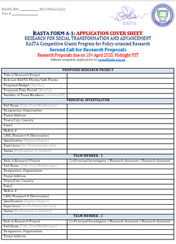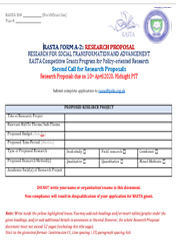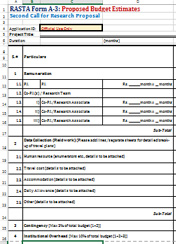The Pakistan Institute of Development Economics (PIDE) has launched a multi-year competitive grants program for policy-oriented research in Pakistan titled ‘Research for Social Transformation and Advancement’ (RASTA) under the Public Sector Development Program (PSDP) of the Ministry of Planning, Development and Special Initiatives, the Government of Pakistan.
RASTA’s mission is to develop a high-quality research network of academia and think tanks across Pakistan producing high-quality, evidence-based policy research to inform Pakistan’s public policy process. RASTA is building on an earlier Competitive Grants Proposal of the Planning Commission of Pakistan 2011-14. See Haque and Orden (2018) for a summary.
The objectives of RASTA program are to:
- Reduce research-policy gap by stimulating economic and social science research and debate across Pakistan.
- Build a network to stimulate internally defined and produced policy-relevant research within a context of crowd-sourced ideas.
- Provide a knowledge-sharing/generating platform where different actors can present and share evidence-based research to inform decision-making in the government.
- Revisit the future policy agenda in line with the evidence produced in this program.
- Build capacity and improve policymaking and implementation by involving and engaging local universities, think tanks, policymakers, practitioners, and other stakeholders.
With these objectives, the program seeks to develop local thought communities and generate knowledge. Substantial outputs will be completed in important areas of public policy that will produce insightful research and facilitate goals that the Government wants to achieve according to its vision.
RASTA CGP ROUND II: CALL FOR RESEARCH PROPOSALS
RASTA Competitive Grants Program invites second round of research proposals on the following themes:
1. PUBLIC POLICY PROCESSES & ECONOMIC DEVELOPMENT
1.1. PUBLIC FINANCIAL MANAGEMENT
- Analysis of the budget process (federal and provincial)
- Analysis of Medium-Term Budgetary Framework (federal and provincial)
- Regional GDP estimation
1.2. TAX ADMINISTRATION: POLICY ANALYSIS AND REFORM PROCESS
- Tax policy and its economic consequences (documentation, compliance and avoidance)
- Tax expenditures: Exploring the rationale of tax exemptions & concessions
- Tariff and protection policy: Trade instrument or revenue generation
- Inter-governmental Resource Distribution in Pakistan: Framework & Distribution Criteria of National Finance Commission (NFC), Provincial Finance Commissions (PFC), and Others
1.3. FISCAL RESPONSIBILITY AND DEBT MANAGEMENT
1.4. DEVOLUTION IN PAKISTAN
- Fiscal, administrative and political devolution
- Fiscal devolution: Emergence, dimensions, and repercussions
- Local/City government: Institutional structures and processes
- Evaluation of public service delivery (post-18th Constitutional Amendment)
- Inter-governmental Institutional Framework & Relations: CCI, IPC, and the Management of Devolved Subjects (post-18th Constitutional Amendment)
1.5. POLITICAL ECONOMY OF DEVELOPMENT BUDGET
- Analyses of PSDP/ADP: Sectoral and regime analyses
- Review of PSDP/ADP processes: Identification, allocation, and implementation
- The HAQ/HAG model: Evaluation of governments’ major development initiatives (projects/programs)
- Institutionalizing PC-V: What would it take?
2. FOREIGN AID EFFECTIVENESS
2.1. AID POLICY MANAGEMENT IN PAKISTAN
- Policies, processes and institutional arrangements
- Politics of aid in Pakistan
2.2. ECONOMICS OF FOREIGN ECONOMIC ASSISTANCE
- The International Finance Institutes and Pakistan’s economy
- Debt management and economic development in Pakistan
- Aid volatility and its consequences for Pakistan’s economy
2.3. EVALUATION OF DONOR-LED DEVELOPMENT INITIATIVES IN PAKISTAN
- Cost & benefit analyses of project/program activities; Assessment of technical assistance; and Examination of consultant culture in Pakistan
- Development partners and local development in Pakistan (INGOs, NGOs and CSOs)
2.4. REVIEW OF LEADING DONOR AGENCIES IN PAKISTAN
- Review of leading multilateral/bilateral donors’ country partnership strategies and development priorities for Pakistan; Explore their funds allocation/expenditure and development operations in Pakistan; Study donor-donor & donor-government coordination and engagement practices.
3. AGRICULTURAL & REAL ESTATE MARKETS
3.1. AGRICULTURE AND AGRICULTURAL MARKETS
- Agricultural Input Supply Market
- Study land, labour, loans, equipment, and use of technology
- Agricultural Product Market
- Examine production, collection, transportation, storage, processing, and packaging
- Tariffs and non-tariff measures affecting trade
- Agricultural Wholesale and Retail Market
- Explore the information, grading and price control mechanisms
- Dynamics of Food Inflation in Pakistan
- Emergence and Potential Contribution of the Blue Economy and Coastal Resource Development
- Review of Agriculture Laws, Performance of R&D Institutes, and Extension Services
- Product Development, Certification and Branding
- Study project development, branding and value addition in crops, fisheries and livestock
3.2. REAL ESTATE MARKET DYNAMICS IN PAKISTAN
- The Real Estate Market in Pakistan
- Study processes, laws & regulations, transparency, availability of information, zoning, human resource development; Explore construction industry linkages; Study housing demand & supply in Pakistan; Examine investors, agents and consumer behavior; and study public private partnerships in the real estate market.
- Land Titling, Legal Framework, Regulations and Trading
- Role of the government, judiciary and local/city administration
- Historical evolution and transformation of the land tenure, land title, and land rights regimes
- Case studies on land record management information system
- Public Sector versus Private Sector Housing Projects
- Single/comparative case studies to understand housing projects from initiation to completion, and post-completion operations & maintenance services
- Political economy of large-scale urban housing projects
RASTA CGP Round 2 invites research proposals on the above listed themes/sub-themes. Proposed studies must identify key policy issues and public policy decisions in Pakistan; assesses outcomes of those decisions empirically; evaluates constraints to policy reform; and examines alternative policy recommendations to enhance their impact. The proposal submission is due by 20th April 2021, midnight Pakistan Standard Time (PST).
GRANTS DESCRIPTION
This is RASTA Competitive Grants Program’s second call for research proposals. Submissions will be thoroughly reviewed, and progress of award studies will be closely monitored by the ‘Research Advisory Committee’ (RAC) of RASTA. Following are the broad principals of the program:
- The maximum duration to complete a project will be 12 months.
- The maximum grant available for a project is 4.0 million.
- Proposals will be judged by the choice of the problem and expected knowledge outcomes for countrywide or local development.
- All data collected and work produced under RASTA will have to be submitted for authenticity checks.
- Multiple conferences/workshops will be organized allowing all reviewers, award winners and sector specialists to see progress and develop network learning.
- Evaluation of government initiatives, policies and processes, and assessment of institutions and their performance in broader socio-economic and development context are encouraged.
- Female applicants, students and researchers from less developed areas of Pakistan are encouraged to participate in the RASTA program.
Application Qualifications: Research proposals are solicited from qualified individuals (and/or groups of individuals) interested in the economic development and public policy issues of Pakistan, including faculty members and staff at international, national and provincial universities and research institutes within and outside Pakistan. Research proposals are encouraged from Pakistani graduate students enrolled in PhD and thesis-based MS/MPhil degree programs at Pakistani and foreign universities, or from faculty members to support the research of these students.
In light of the RASTA objectives and inclusion policy, three Tiers have been defined so as to give equal opportunity to the applicants from less developed areas. Tier 1 includes applicants/institutes in the North and Central Punjab, Karachi and all foreign institutes; Tier 2 includes applicants/institutes in the South of Punjab, interior Sindh and KP province; while Tier 3 includes applicants/institutes in Balochistan, Gilgit-Baltistan, and Azad Jammu & Kashmir. Proposals from each of the three tiers will be evaluated in separate competitive categories. Outstanding proposals from each category are anticipated to be funded. Proposals may be submitted by individual applicants or by teams of up to four co-investigators. Collaborative proposals by teams based at multiple institutions and/or involving practitioners from the relevant policy sector organization are encouraged.
APPLICATION GUIDELINES
Elements of the Grant Application: English is the language to be used in the RASTA Competitive Grants Program. Applications must include the following:
- RASTA Form A-1 (Cover Sheet)
- RASTA Form A-2 (Technical Proposal)
- RASTA Form A-3 (Financial Proposal)
- Additional Documents:
- For professional applicants: A brief curriculum vitae (1-3 pages) for Principal Investigator/Co-PI.
- For student applicants: (i) Official transcript of graduate coursework completed and list of planned additional course enrolment, and (ii) A letter of recommendation from the applicant’s supervisor.
Submission Process and Deadline: Download all RASTA Application Forms (A-1, A-2 and A-3) from RASTA website. Complete forms (in MS Word format) must be submitted electronically to rasta@rasta.pide.org.pk before the deadline. Complete applications will be acknowledged by return email within 14 days after the submission deadline.
- Do NOT mention your name and/or organization anywhere except in Form A-1 (Cover Sheet). The application will not be processed in case of non-compliance. There is no need to submit a hardcopy of the application.
- The deadline for applications submission is 20th April 2021 by midnight, Pakistan Standard Time (PST). Incomplete applications and applications received after this deadline will not be considered.
Budget Guidelines: Remuneration of maximum Rs. 150,000 per month for each member of the research team and/or a maximum of 75% of the total announced grant, i.e., Rs. 3.0 Million, can be availed under RASTA CGP. A research team can be comprised of a maximum of four members, including the PI. The Co-PIs may not be paid more than the PI. Income tax on remuneration will be deducted at source. For field visits/data collection, TADA/accommodation costs can be included as per the Federal Govt rules. A maximum of 03% contingency and 10% institutional overhead of the calculated budget are permissible.
Disbursement of funds to successful grant applicants will occur in three tranches linked to the deliverables: (i) 30% upon selection of the proposal for an award; (ii) 30% upon satisfactory acceptance by the review panel of an interim research report & presentation at the Mid-Term Review Workshop; and finally (iii) 40% upon satisfactory acceptance by the review panel of the project’s final research report & presentation at the RASTA Conference.
- NOTE: There is No provision for any hardware/software purchases including data, books, laptop, software, equipment etc. Publishing, printing and dissemination of the study is the responsibility of RASTA. Awardee shall provide duly verified receipts of all expenses. If there is any unspent balance, it will be adjusted in the 3rd instalment.
PROCEDURE OF COMPETITIVE GRANTS PROGRAM
Selection Criteria and Process: All complete grant applications will be reviewed by a scholarly review panel comprised of members of the Research Advisory Committee (RAC). Proposals will be evaluated based on (i) The importance of the topic and relevance to the given research themes; (ii) Cohesion and creativity of the proposed research; (iii) Research design and technical feasibility of the proposed research approach and analysis; (iv) Value of expected research outcomes for public policy; and (v) Qualifications of the Principal Investigator(s) for undertaking the proposed study. Equal weight will be given to each criterion. Top-ranked proposals will be invited for oral presentation (in person or online) before the review panel in June 2021. Selection decision and grant awards will be announced by June 30, 2021. See RASTA Notes #02 to understand the review process.
EXPECTED OUTPUTS AND RESEARCH DISSEMINATION
RASTA grant recipients are expected to produce a research article or monograph of international peer-reviewed publication quality. Interim and final reports submitted to the review panel for approval of grant fund disbursements are expected to be intermediate products leading to final published output as RASTA Working Paper and/or a Book Chapter. The RAC may also ask the grant recipient to produce one or two RASTA Policy Briefs for wider research dissemination.
The RASTA program will organise bi-annual research conferences/workshops. RASTA grant recipients will be expected make two presentations of their work: an initial presentation corresponding to their interim research report at the Mid-Term Review Workshop and a final presentation corresponding to their final research report at the RASTA Conference. Members of the RAC and other invitees from the public & private sector will participate in these events.
3



